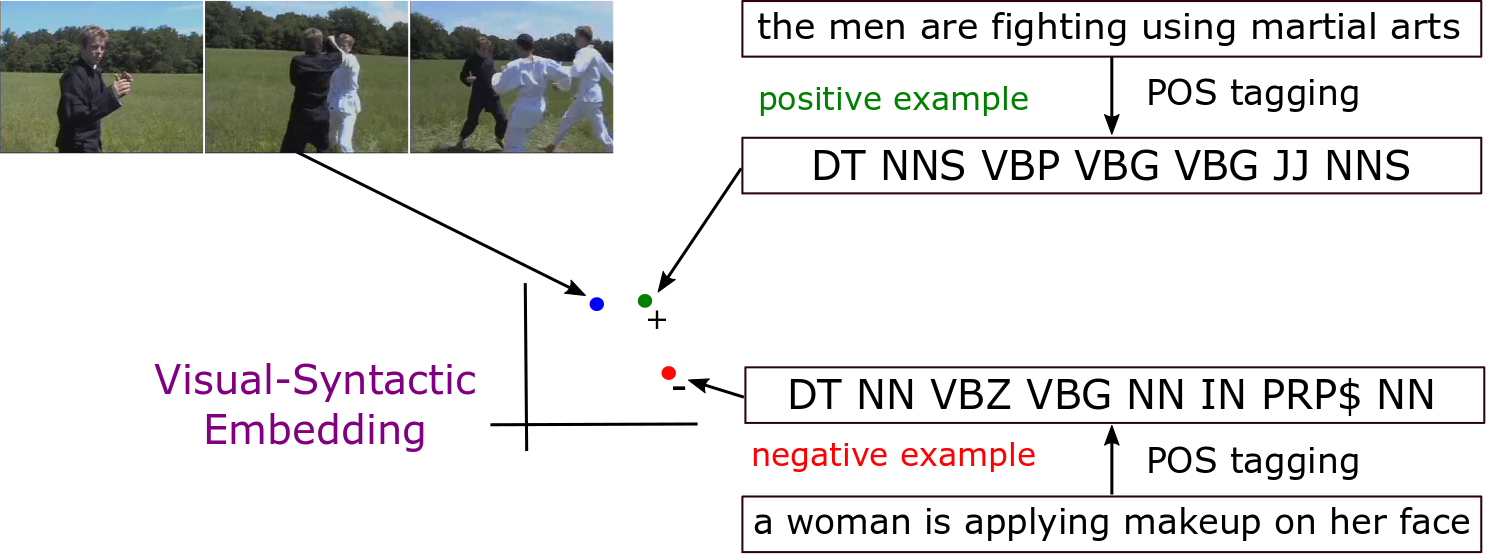This repository is the source code for the paper titled Improving Video Captioning with Temporal Composition of a Visual-Syntactic Embedding. Video captioning is the task of predicting a semantic and syntactically correct sequence of words given some context video. In this paper, we consider syntactic representation learning as an essential component of video captioning. We construct a visual-syntactic embedding by mapping into a common vector space a visual representation, that depends only on the video, with a syntactic representation that depends only on Part-of-Speech (POS) tagging structures of the video description. We integrate this joint representation into an encoder-decoder architecture that we call Visual-Semantic-Syntactic Aligned Network (SemSynAN), which guides the decoder (text generation stage) by aligning temporal compositions of visual, semantic, and syntactic representations. We tested our proposed architecture obtaining state-of-the-art results on two widely used video captioning datasets: the Microsoft Video Description (MSVD) dataset and the Microsoft Research Video-to-Text (MSR-VTT) dataset.
 |
 |
| Video Captioning with Visual-Syntactic Embedding (SemSynAN) | Visual-Syntactic Embedding |
- Python 3.6
- PyTorch 1.2.0
- NumPy
- h5py
git clone --recursive https://github.com/jssprz/visual_syntactic_embedding_video_captioning.git
mkdir -p data/MSVD && wget -i msvd_data.txt -P data/MSVD
mkdir -p data/MSR-VTT && wget -i msrvtt_data.txt -P data/MSR-VTT
For extracting your own visual features representations we provide the visual-feature-extracotr package.
If you want to train your own models, you can reutilize the datasets' information stored and tokenized in the corpus.pkl files. The content of these files is organized as follow:
0: train_data: captions and idxs of training videos in format [corpus_widxs, vidxs], where:
corpus_widxsis a list of lists with the index of words in the vocabularyvidxsis a list of indexes of video features in the features file
1: val_data: same format of train_data.
2: test_data: same format of train_data.
3: vocabulary: in format {'word': count}.
4: idx2word: is the vocabulary in format {idx: 'word'}.
5: word_embeddings: are the vectors of each word. The i-th row is the word vector of the i-th word in the vocabulary.
We use the val_references.txt and test_references.txt files for computing the evaluation metrics only.
- Download pre-trained models at epochs 41 (for MSVD) and 12 (for MSR-VTT)
wget https://s06.imfd.cl/04/github-data/SemSynAN/MSVD/captioning_chkpt_41.pt -P pretrain/MSVD
wget https://s06.imfd.cl/04/github-data/SemSynAN/MSR-VTT/captioning_chkpt_12.pt -P pretrain/MSR-VTT
- Generate captions for test samples
python test.py -chckpt pretrain/MSVD/captioning_chkpt_41.pt -data data/MSVD/ -out results/MSVD/
python test.py -chckpt pretrain/MSR-VTT/captioning_chkpt_12.pt -data data/MSR-VTT/ -out results/MSR-VTT/
- Metrics
python evaluate.py -gen results/MSVD/predictions.txt -ref data/MSVD/test_references.txt
python evaluate.py -gen results/MSR-VTT/predictions.txt -ref data/MSR-VTT/test_references.txt
| Dataset | epoch | B-4 | M | C | R |
|---|---|---|---|---|---|
| MSVD | 100 | 64.4 | 41.9 | 111.5 | 79.5 |
| MSR-VTT | 60 | 46.4 | 30.4 | 51.9 | 64.7 |
@article{PerezMartin2020AttentiveCaptioning,
title={Improving Video Captioning with Temporal Composition of a Visual-Syntactic Embedding},
author={Jesus Perez-Martin and Benjamin Bustos and Jorge Pérez},
booktitle={IEEE Winter Conference on Applications of Computer Vision},
year={2021}
}
